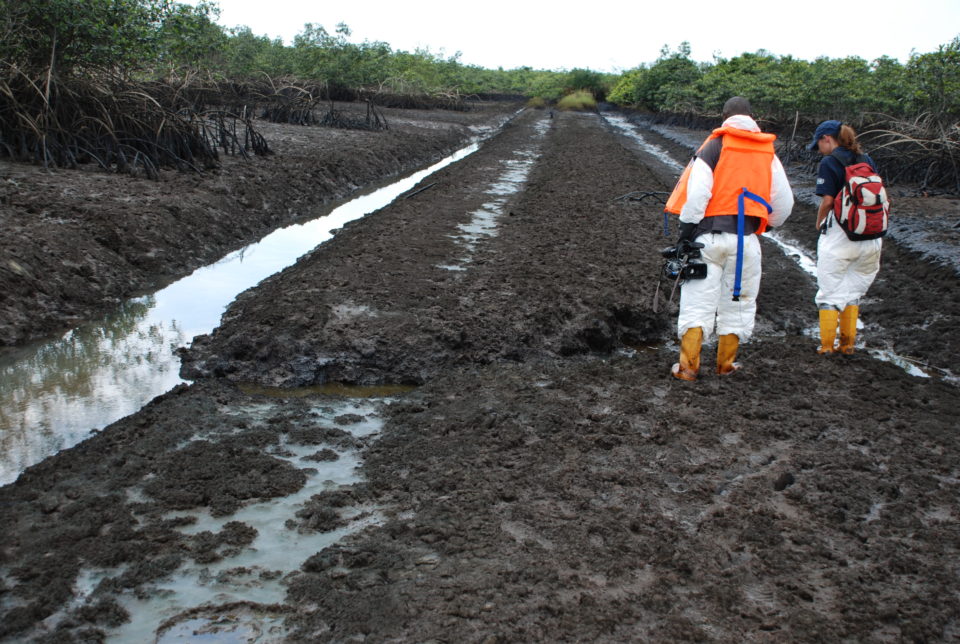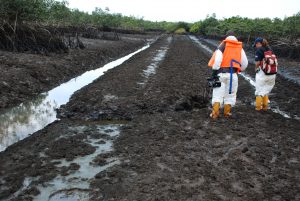
 Recently, the Minister of Environment, Amina Mohammed, announced that President Muhammadu Buhari was set to launch the cleanup of Ogoniland very soon.
Recently, the Minister of Environment, Amina Mohammed, announced that President Muhammadu Buhari was set to launch the cleanup of Ogoniland very soon.
The minister made the announcement during her courtesy visit to the Rivers state Governor, Nyesom Wike, reiterating that Ogoniland would be the first place where the clean-up action would take off.
Muhammed, who visited some polluted communities in Niger Delta region in the company of the Minister of State for Environment, Ibrahim Usman Jubril, as part of preparations for the formal launch of the project, noted that cleaning up the polluted water, land and air of Ogoni
communities was not just a Nigerian issue, but an international obligation.
She said: “there is a wide challenge of pollution in the Niger Delta. We are here to begin activities toward the launch of the cleanup with stakeholders’ dialogue.
“We are beginning in Rivers because this is the home of the struggle but we know it is wider.” The minister said the clean-up of Ogoni land, which has been suffering for over five decades, would span between 25 and 30 years.
This is coming five years after the United Nations Environmental Programme (UNEP) submitted its report on polluted communities in Ogoni land.
Meanwhile, President Muhammadu Buhari has already approved several actions to fast-track the long delayed implementation of the United Nations Environmental Programme Report (UNEP) on the environmental restoration of Ogoni land.
The actions approved by President Buhari, based on recommendations to him by the Executive Director of UNEP, the UNEP Special Representative for Ogoni land, permanent secretaries of the Federal Ministries of Environment and Petroleum Resources, and others, include the amendment of the official gazette establishing the hydrocarbon.
The President has also approved that the hydrocarbon pollution restoration project (HYPREP) Governing Council should be composed of representatives of the Ministry of Petroleum Resources, Federal Ministry of Environment, impacted states, oil companies and the Nigerian National Petroleum Corporation, representatives from Ogoni land, representatives from the United Nations System.
He also approved the composition of a Board of Trustees for the HYPREP Trust Fund. As a matter of fact, following a meeting held on the directive of the president, it was also agreed that a contribution deposit of $10 million (N2 billion) would be made by stakeholders within 30 days of the appointment of members of the Board of Trustees for the Trust Fund, who will be responsible for collecting and managing funds from contributors and donors.
A new implementation template has also been evolved at the instance of President Buhari, and the environmental clean-up of Ogoni land will commence in earnest with the President’s inauguration of the HYPREP Governing Council and the Board of Trustees for the Trust Fund.
Just like the previous administration, President Buhari, during the electioneering in January 2015, also promised traditional rulers and the people of Ogoni a speedy commencement of implementation of the UNEP report. Even though the promise by President Buhari to restore the region has been met by optimism, many still fear that this may be another futile promise which has characterised previous administration on the issue of cleaning up the contaminated region.
It would be recalled that in 2009, the government appeared to have bowed to pressure from agitators in the region with the commissioning of United Nations Environmental Programme (UNEP) to carry out an Environmental Assessment of Ogoni land. The then President, Goodluck Jonathan, went ahead to set up a Presidential Implementation Committee (PIC) to review its findings.
Despite setting up Hydrocarbon Pollution Restoration Project to restore all communities impacted by hydro-carbon contamination and implement the actionable recommendations of the UNEP Environmental Assessment Report on Ogoni land, the project somehow didn’t see the light of the day.
The immediate past Minister of Petroleum Resources, Mrs. Dizaeni Alison-Madueke, had in 2014 promised the international community of commencement of the implementation by 2015. According to her, “the government feels it is important to start the process in an aggressive manner.”
She said: “We also think that there are some quick-wins that can be started as early as January next year. If we do not get to do this within a very short period, we may not get to do it again. The federal government is ready to fulfill its own counterpart funding that will not be path of the regular budgetary provision and that is why an independent body has been set up to manage the fund. On our part, government is committed to ensure this process is kick-started and will continue to take practical steps to encourage all the stakeholders to see to the success of the implementation.”
One major problem that has affected the Ogoni land project remains the political conflict of interest and lack of genuine will to implement the project. More so, the clean-up would cover he span of 25-30years, makes it even more difficult as the longest serving political party at the federal level has served for just 16 years with the longestserving democratically elected president serving for eight years; thus starting the project may not be an issue but continuation by incoming
administration.
The problem of political interest was reiterated by Governor Wike while receiving the minister as he warned the federal government against patronising political interests.
Wike said: “Communities do not know about political parties, what communities know is about how to survive, it doesn’t matter the political party that anybody belongs to, environmental issues does not affect a political party; it affects the entire state and the entire Niger Delta as a whole. And so, I will advise that we approach it in such way that it does not look political, particularly in Ogoni land, it is a very complex place; you have to be extremely careful. Because if you are not careful you may not achieve what you intend to achieve.”
While the current administration’s stance on cleaning the Ogoni land remains laudable, the contribution and cooperation of various stakeholders remains vital. In this vein, the Federal Ministry of Environment has initiated informal meetings with key stakeholders, including the Special Adviser in charge of Amnesty programme to ensureconsideration and inclusiveness. Other stakeholders consulted include the traditional rulers in Ogoni land, international oil companies, state government and security agencies.
The environment minister further reiterated that this administration is bent on fulfilling its promise of cleaning up the region. “The only thing we can do is to deliver, if we do not deliver it is a failure on our part, and it is not my intention to fail. Hold us into account, we have promised to deliver. It is not a Nigerian issue, it is an international obligation.”
Although, Ogoni land is one of the most oil-polluted places on earth, it could become a model for other countries wanting to clean up their environments if the Nigerian government fulfills their promises to
restore the region.
